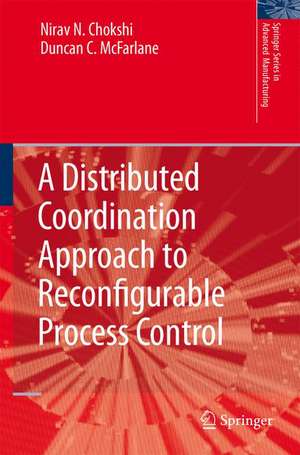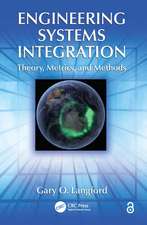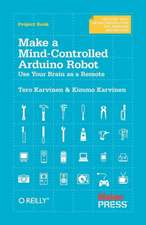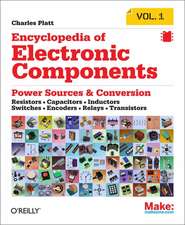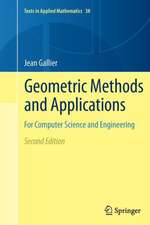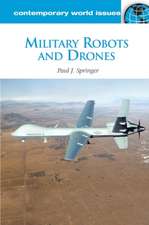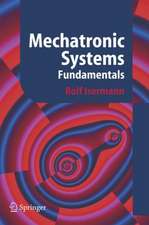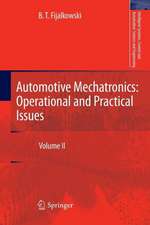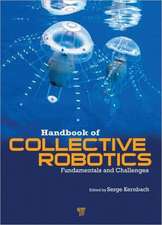A Distributed Coordination Approach to Reconfigurable Process Control: Springer Series in Advanced Manufacturing
Autor Nirav Chokshi, Duncan McFarlaneen Limba Engleză Hardback – 15 noi 2007
| Toate formatele și edițiile | Preț | Express |
|---|---|---|
| Paperback (1) | 635.80 lei 6-8 săpt. | |
| SPRINGER LONDON – 28 oct 2010 | 635.80 lei 6-8 săpt. | |
| Hardback (1) | 642.03 lei 6-8 săpt. | |
| SPRINGER LONDON – 15 noi 2007 | 642.03 lei 6-8 săpt. |
Din seria Springer Series in Advanced Manufacturing
- 18%
 Preț: 1124.92 lei
Preț: 1124.92 lei - 18%
 Preț: 952.89 lei
Preț: 952.89 lei - 18%
 Preț: 1122.56 lei
Preț: 1122.56 lei - 17%
 Preț: 463.35 lei
Preț: 463.35 lei - 18%
 Preț: 1231.95 lei
Preț: 1231.95 lei - 15%
 Preț: 671.14 lei
Preț: 671.14 lei - 20%
 Preț: 691.51 lei
Preț: 691.51 lei - 18%
 Preț: 956.81 lei
Preț: 956.81 lei - 15%
 Preț: 632.37 lei
Preț: 632.37 lei - 20%
 Preț: 655.85 lei
Preț: 655.85 lei - 15%
 Preț: 636.94 lei
Preț: 636.94 lei - 18%
 Preț: 949.06 lei
Preț: 949.06 lei - 18%
 Preț: 1830.17 lei
Preț: 1830.17 lei - 19%
 Preț: 562.16 lei
Preț: 562.16 lei - 18%
 Preț: 1821.63 lei
Preț: 1821.63 lei - 18%
 Preț: 945.79 lei
Preț: 945.79 lei - 18%
 Preț: 949.10 lei
Preț: 949.10 lei - 18%
 Preț: 1552.01 lei
Preț: 1552.01 lei - 18%
 Preț: 1383.81 lei
Preț: 1383.81 lei - 18%
 Preț: 958.38 lei
Preț: 958.38 lei - 15%
 Preț: 639.25 lei
Preț: 639.25 lei - 18%
 Preț: 952.72 lei
Preț: 952.72 lei - 18%
 Preț: 945.79 lei
Preț: 945.79 lei - 15%
 Preț: 647.27 lei
Preț: 647.27 lei - 18%
 Preț: 945.92 lei
Preț: 945.92 lei - 18%
 Preț: 1215.99 lei
Preț: 1215.99 lei - 18%
 Preț: 1226.73 lei
Preț: 1226.73 lei - 18%
 Preț: 1840.43 lei
Preț: 1840.43 lei - 18%
 Preț: 1225.13 lei
Preț: 1225.13 lei - 18%
 Preț: 952.72 lei
Preț: 952.72 lei - 15%
 Preț: 634.68 lei
Preț: 634.68 lei - 15%
 Preț: 641.53 lei
Preț: 641.53 lei - 18%
 Preț: 947.35 lei
Preț: 947.35 lei - 18%
 Preț: 954.45 lei
Preț: 954.45 lei - 18%
 Preț: 951.77 lei
Preț: 951.77 lei - 15%
 Preț: 634.68 lei
Preț: 634.68 lei - 15%
 Preț: 636.94 lei
Preț: 636.94 lei - 18%
 Preț: 945.14 lei
Preț: 945.14 lei - 15%
 Preț: 638.89 lei
Preț: 638.89 lei - 18%
 Preț: 958.73 lei
Preț: 958.73 lei - 18%
 Preț: 1104.88 lei
Preț: 1104.88 lei - 18%
 Preț: 1226.73 lei
Preț: 1226.73 lei
Preț: 642.03 lei
Preț vechi: 755.33 lei
-15% Nou
Puncte Express: 963
Preț estimativ în valută:
122.89€ • 133.53$ • 103.30£
122.89€ • 133.53$ • 103.30£
Carte tipărită la comandă
Livrare economică 21 aprilie-05 mai
Preluare comenzi: 021 569.72.76
Specificații
ISBN-13: 9781848000599
ISBN-10: 1848000596
Pagini: 204
Ilustrații: XI, 192 p.
Dimensiuni: 155 x 235 x 13 mm
Greutate: 0.46 kg
Ediția:2008
Editura: SPRINGER LONDON
Colecția Springer
Seria Springer Series in Advanced Manufacturing
Locul publicării:London, United Kingdom
ISBN-10: 1848000596
Pagini: 204
Ilustrații: XI, 192 p.
Dimensiuni: 155 x 235 x 13 mm
Greutate: 0.46 kg
Ediția:2008
Editura: SPRINGER LONDON
Colecția Springer
Seria Springer Series in Advanced Manufacturing
Locul publicării:London, United Kingdom
Public țintă
ResearchCuprins
Problem Development.- Reconfigurable Process Control Research.- A Distributed Reconfigurable Process Control Approach.- DRPC: Distributed Reconfigurable Process Control.- Reconfigurable Process Control Architecture.- An Interaction Model for Reconfigurable Process Control.- A Distributed Algorithm for Reconfigurable Process Control.- An Assessment of the DRPC Approach.- Application of Distributed Coordination Approach — A Case Example.- Conclusions.
Recenzii
From the reviews:
"The book is well organized and presents the most important classical and modern essentials of manufacturing control engineering. Suitable for senior under graduate and under graduate students as well as practical engineers and researchers interested in a distributed coordination approach to reconfigurable process control." (Seenith Sivasundaram, Zentrablatt MATH, Vol. 1153, 2009)
"The book is well organized and presents the most important classical and modern essentials of manufacturing control engineering. Suitable for senior under graduate and under graduate students as well as practical engineers and researchers interested in a distributed coordination approach to reconfigurable process control." (Seenith Sivasundaram, Zentrablatt MATH, Vol. 1153, 2009)
Notă biografică
Nirav Chokshi is a Visiting Researcher with the Centre for Distributed Automation and Control at the University of Cambridge. He has worked in the chemical industry and the nuclear industry, where he was involved in a variety of small-to-medium scale projects on design and maintenance of process automation systems. His research interests include distributed automation, systems integration and process optimization and control.
Duncan McFarlane is a Professor of Service and Support Engineering at the Engineering Department of the University of Cambridge, and Head of the Distributed Information & Automation Laboratory within the Institute for Manufacturing. He is also Director of the Cambridge Auto-ID Lab and Research Director of two industrially supported activities: the Service and Support Engineering Programme and the Aero ID Programme. He has been involved in the design and operation of automation and information system for the manufacturing supply chain for twenty years. His research interests include manufacturing control & automation, modular manufacturing systems design, analysis and synthesis of co-operative control systems, information filtering, model tuning and adaptation, manufacturing systems integration, fault diagnostics, automated identification systems, quality control, and supply chain execution systems.
Duncan McFarlane is a Professor of Service and Support Engineering at the Engineering Department of the University of Cambridge, and Head of the Distributed Information & Automation Laboratory within the Institute for Manufacturing. He is also Director of the Cambridge Auto-ID Lab and Research Director of two industrially supported activities: the Service and Support Engineering Programme and the Aero ID Programme. He has been involved in the design and operation of automation and information system for the manufacturing supply chain for twenty years. His research interests include manufacturing control & automation, modular manufacturing systems design, analysis and synthesis of co-operative control systems, information filtering, model tuning and adaptation, manufacturing systems integration, fault diagnostics, automated identification systems, quality control, and supply chain execution systems.
Textul de pe ultima copertă
The need to adapt to the demands of global supply chains in real-time is of significant importance to the future success of continuous process industries. Amongst such business drivers, it will become critical that process plants are designed to be easily reconfigured as and when necessary. Recent developments in process control have attempted to address this requirement, yet there has not been a systematic effort made on the analysis of the fundamental shortcomings in the modularity of process control systems.
A Distributed Coordination Approach to Reconfigurable Process Control presents research that addresses this critical question, via developing a new distributed framework that will enable the building of a process control system that is capable of reconfigurability. This framework views the process as a set of readily-integrated, modular process elements, which operate relatively independently and are each supported by a degree of stand-alone decision-making capability. The rationale and benefits of moving towards the new approach is demonstrated by means of a worked example of a real process plant.
A Distributed Coordination Approach to Reconfigurable Process Control will be a useful reference to both academic and industrial practitioners working in the field of design and integration of process control systems. The new architectural dimension presented in this research will also help end-users to gain an understanding of the economic aspects of material flows across their plants, and the ways in which their processes can be integrated across the enterprise.
A Distributed Coordination Approach to Reconfigurable Process Control presents research that addresses this critical question, via developing a new distributed framework that will enable the building of a process control system that is capable of reconfigurability. This framework views the process as a set of readily-integrated, modular process elements, which operate relatively independently and are each supported by a degree of stand-alone decision-making capability. The rationale and benefits of moving towards the new approach is demonstrated by means of a worked example of a real process plant.
A Distributed Coordination Approach to Reconfigurable Process Control will be a useful reference to both academic and industrial practitioners working in the field of design and integration of process control systems. The new architectural dimension presented in this research will also help end-users to gain an understanding of the economic aspects of material flows across their plants, and the ways in which their processes can be integrated across the enterprise.
Caracteristici
Presents research in the field of distributed automation and control within the process industries Includes supplementary material: sn.pub/extras
